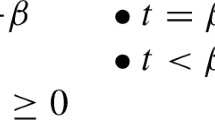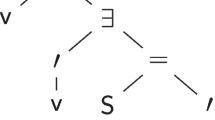Abstract
Recent years have witnessed a proliferation of attempts to apply the mathematical theory of probability to the semantics of natural language probability talk. These sorts of “probabilistic” semantics are often motivated by their ability to explain intuitions about inferences involving “likely” and “probably”—intuitions that Angelika Kratzer’s canonical semantics fails to accommodate through a semantics based solely on an ordering of worlds and a qualitative ranking of propositions. However, recent work by Wesley Holliday and Thomas Icard has been widely thought to undercut this motivation: they present a world-ordering semantics that yields essentially the same logic as probabilistic semantics. In this paper, I argue that the challenge remains: defenders of world-ordering semantics have yet to offer a plausible semantics that captures the logic of comparative likelihood. Holliday & Icard’s semantics yields an adequate logic only if models are restricted to Noetherian pre-orders. But I argue that the Noetherian restriction faces problems in cases involving infinitely large domains of epistemic possibilities. As a result, probabilistic semantics remains the better explanation of the data.
Similar content being viewed by others
References
Cariani, F. (2016). Deontic modals and probability: one theory to rule them all? In Charlow, N, & Chrisman, M (Eds.) Deontic modality: Oxford University Press.
Carr, J. (2015). Subjective ought. Ergo, an Open Access Journal of Philosophy, 2.
de Finetti, B. (1974). Theory of probability Vol. 1 and 2. New York: Wiley.
Easwaran, K. (2014). Regularity and hyperreal credences. Philosophical Review, 123(1), 1–41.
Faller, M. (2011). A possible worlds semantics for Cuzco Quecha Evidentials. In Proceedings of SALT 20.
Hamblin, C.L. (1959). The modal “probably”. Mind, 68(270), 234–240.
Harrison-Trainor, M., & et al. (2017). Preferential structures for comparative probabilistic reasoning. In Proceedings of the thirty-first AAAI conference on artificial intelligence.
Harrison-Trainor, M., & et al. (2018). Inferring probability comparisons. Mathematical Social Sciences, 91, 62–70.
Holliday, W.H., & Icard, T. (2013). Measure semantics and qualitative semantics for epistemic modals. Postprint of publication in proceedings of SALT 23; https://philosophy.berkeley.edu/file/869/Holliday_and_Icard_SALT_23.pdf.
Holliday, W.H., & Icard, T. (2018). Axiomatization in the meaning sciences. In Ball, D., & Rabern, B. (Eds.) The science of meaning: essays on the metatheory of natural language semantics (pp. 73–97). Oxford: Oxford University Press.
Holliday, W.H., & Icard, T.F. (2013). Measure semantics and qualitative semantics for epistemic modals. Proceedings of SALT, 23, 514–534.
Koopman, B.O. (1940). The axioms and algebra of intuitive probability. Annals of Mathematics, 269–292.
Kratzer, A. (1981). The notional category of modality. In Eikmeyer, & Rieser (Eds.) Words, worlds, and contexts, new approaches to word semantics (pp. 38–74). Berlin: Walter de Gruyter.
Kratzer, A. (1986). Conditionals. Chicago Linguistics Society, 22(2), 1–15.
Kratzer, A. (1991). Modality. In von Stechow, A., & Wunderlich, D. (Eds.) Semantics: an international handbook of contemporary research (pp. 539–50). Berlin: Walter de Gruyter.
Kratzer, A. (2012). Modals and conditionals: new and revised perspectives. Oxford University Press.
Lassiter, D. (2010). Gradable epistemic modals, probability, and scale structure. In Proceedings of SALT 20.
Lassiter, D. (2011). Measurement and modality: the scalar basis of modal semantics. Ph.D. thesis, New York University.
Lassiter, D. (2015). Epistemic comparison, models of uncertainty, and the disjunction puzzle. Journal of Semantics, 32(4), 649–684.
Lassiter, D. (2016). Linguistic and philosophical considerations on Bayesian semantics. In Chrisman, M., & Charlow, N. (Eds.) Deontic modals (pp. 82–116). Oxford: Oxford University Press.
Lassiter, D. (2017). Graded modality: qualitative and quantitative perspectives. Oxford: Oxford University Press.
Lauwers, L. (2009). The uniform distributions puzzle. Available at SSRN: https://papers.ssrn.com/sol3/papers.cfm?abstract_id=1393712.
Lewis, D.K. (1973). Counterfactuals. Blackwell.
MacFarlane, J. (2011). Epistemic modals are assessment sensitive. In Egan, A, & Weatherson, B (Eds.) Epistemic modality: Oxford University Press.
MacFarlane, J. (2014). Assessment sensitivity. Oxford: Oxford University Press.
McCall, S., & Armstrong, D.M. (1989). God’s lottery. Analysis, 49(4), 223–224.
Moss, S. (2013). Epistemology formalized. Philosophical Review, 122(1), 1–43.
Moss, S. (2015). On the semantics and pragmatics of epistemic vocabulary. Semantics and Pragmatics, 8(5), 1–81.
Moss, S. (2018). Probabilistic knowledge. Oxford: Oxford University Press.
Peterson, T. (2010). Epistemic modality and evidentiality in Gitksan at the semantics-pragmatics interface. Ph.D. thesis: The University of British Columbia.
Popper, K.R. (1955). Two autonomous axiom systems for the calculus of probabilities. British Journal for the Philosophy of Science, 6(21), 51–57.
Portner, P. (2009). Modality. Oxford: Oxford University Press.
Pruss, A.R. (2014). Infinitesimals are too small for countably infinite fair lotteries. Synthese, 191(6), 1051–1057.
Rothschild, D. (2012). Expressing credences. Proceedings of the Aristotelian Society, 112(1pt.1), 99–114.
Suzuki, S. (2013). Epistemic modals, qualitative probability, and nonstandard probability. In Proceedings of the 19th Amsterdam colloquium.
Swanson, E. (2006). Interactions with context. Ph.D. thesis: Massachusetts Institute of Technology.
Swanson, E. (2011). How not to theorize about the language of subjective uncertainty. In Egan, A, & Weatherson, B (Eds.) Epistemic modality: Oxford University Press.
Swanson, E. (2016). The application of constraint semantics to the language of subjective uncertainty. Journal of Philosophical Logic, 45(2), 121–146.
Williamson, T. (2007). How probable is an infinite sequence of heads? Analysis, 67(295), 173–180.
Yalcin, S. (2007). Epistemic modals. Mind, 116(464), 983–1026.
Yalcin, S. (2010). Probability operators. Philosophy Compass, 5/11, 916–937.
Yalcin, S. (2011). Nonfactualism about epistemic modality. In Egan, A, & Weatherson, B. (Eds.) Epistemic modality: Oxford University Press.
Acknowledgments
I am grateful for helpful comments from Stephanie Allen, Adam Bjorndahl, Michael Caie, Fabrizio Cariani, Dmitri Gallow, Anil Gupta, Wesley Holliday, Harvey Lederman, James Shaw, Eric Swanson, and several anonymous referees.
Author information
Authors and Affiliations
Corresponding author
Additional information
Publisher’s Note
Springer Nature remains neutral with regard to jurisdictional claims in published maps and institutional affiliations.
Rights and permissions
About this article
Cite this article
Marushak, A. Probability Modals and Infinite Domains. J Philos Logic 49, 1041–1055 (2020). https://doi.org/10.1007/s10992-020-09547-8
Received:
Accepted:
Published:
Issue Date:
DOI: https://doi.org/10.1007/s10992-020-09547-8




